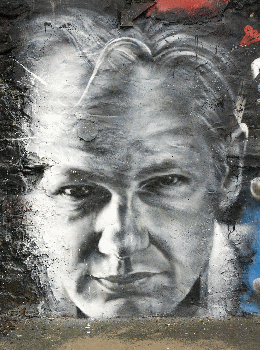
Julian ASSANGE arrested, painted portrait - Wikileaks
(Image by Abode of Chaos from flickr) Details DMCA
On Friday, the English High Court paved the way for WikiLeaks founder Julian Assange to be extradited to the United States and tried over the publication of hundreds of thousands of documents, some of which contained evidence of US and British war crimes in Iraq and Afghanistan.
The decision reversed a ruling in January by a lower court that had blocked the extradition, but only on humanitarian grounds: that Assange would be put at severe risk of suicide by the oppressive conditions of his detention in the US.
The 50-year old Australian faces a sentence of up to 175 years in prison if found guilty.
Amnesty International described the ruling as a "travesty of justice", while Rebecca Vincent of Reporters Without Borders tweeted that it was an "appalling" decision that "marks a bleak moment for journalists and journalism around the world".
Assange's lawyers said they will appeal the ruling at the supreme court. But the fight to free Assange - even if ultimately successful - is certain to drag on for many more years.
The WikiLeaks founder has already spent more than a decade in various forms of incarceration: house arrest, political asylum and, since early 2019, solitary confinement in Belmarsh high-security prison in London.
The toll this has taken is immense, according to Nils Melzer, a law professor and the United Nations' expert on torture. He has repeatedly warned that Assange is suffering the effects of "prolonged exposure to psychological torture".
Family and friends warn that he is regularly confused about basic facts. At one hearing, he visibly struggled even to recall his name and age.
War CrimesThe reasons for Assange's detention have shifted a number of times over the years: from an initial investigation of alleged sex crimes in Sweden, to a bail violation in the UK, and more recently espionage.
But the presence of the US national security state has never been far away. Assange's supporters say Washington has been quietly influencing events, only showing its hand directly when it launched the extradition claim in 2019.
It was clear from the outset that the arguments made by the US could have huge implications for the future of journalism and its ability to hold powerful states to account. And yet the hearings have been given only cursory coverage, especially by the British media.
The case for extradition rests on a US claim that Assange carried out espionage in publishing hundreds of thousands of leaked materials in 2010 and 2011 with high-profile partners such as the New York Times, Washington Post, Guardian, El Pais and Der Spiegel. Called the Iraq and Afghan war logs, the documents show that the US army committed war crimes in those countries, killed non-combatants and carried out torture.
The United States clearly wanted to make sure there would be no recurrence of such a leak.
(Note: You can view every article as one long page if you sign up as an Advocate Member, or higher).





